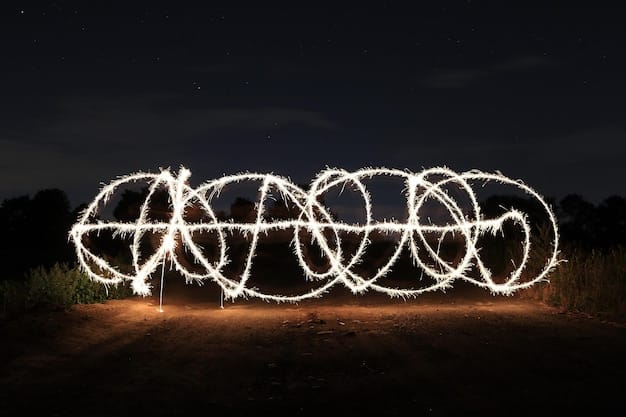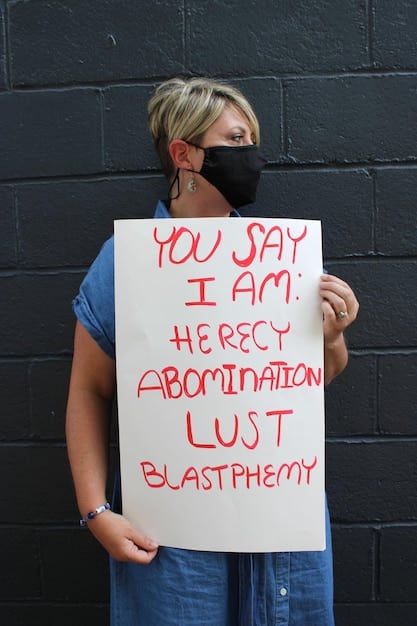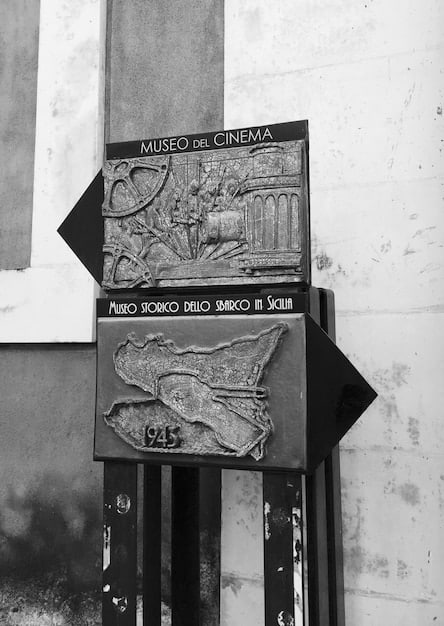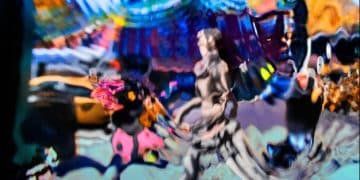Censorship Controversy in Brazilian Documentary: Freedom of Expression at Stake

Controversy Erupts Over Censorship Allegations in New Brazilian Documentary: What Are the Implications for Freedom of Expression? centers around accusations of censorship against a recently released Brazilian documentary, raising critical questions about artistic freedom, government oversight, and the potential chilling effect on filmmakers and journalists.
The release of a new Brazilian documentary has been overshadowed by a fierce debate, as controversy erupts over censorship allegations in the new Brazilian documentary: what are the implications for freedom of expression?
The Accusations: What Happened?
The heart of the controversy revolves around claims that certain scenes or perspectives within the documentary were allegedly suppressed or altered before its public release. These accusations have sparked outrage among filmmakers, journalists, and free speech advocates alike, who see it as a grave threat to artistic independence.
Initial Reactions and Public Outcry
The initial reports of alleged censorship were met with swift condemnation. Social media platforms buzzed with discussions, with many users expressing solidarity with the filmmakers and denouncing any attempts to stifle creative expression. This public outcry has amplified the pressure on the involved parties to address the allegations transparently.
Official Statements and Denials
In response to the growing controversy, relevant governmental bodies and production companies have issued statements. Some have vehemently denied any censorship attempts, asserting that creative decisions were made solely on artistic grounds. However, these denials have been met with skepticism, with critics calling for a full and independent investigation to uncover the truth.

- Allegations of direct interference by government officials.
- Claims that financial incentives were tied to specific narrative choices.
- Concerns that the filmmakers were pressured to self-censor their work.
- Demands for greater transparency in the film production process.
The accusations, denials, and widespread public reaction have created a tense and polarized atmosphere within Brazil’s film industry. The stakes are high, with the potential to set a precedent that could significantly impact the future of filmmaking and freedom of expression in the country.
The Core Argument: Freedom of Expression vs. Government Oversight
At the core of this debate lies the fundamental tension between freedom of expression and government oversight. While freedom of expression is a cornerstone of democratic societies, governments often argue that certain limitations are necessary to protect national security, public order, or the rights of others.
International Legal Frameworks on Freedom of Expression
International human rights laws, such as Article 19 of the International Covenant on Civil and Political Rights, guarantee the right to freedom of expression. However, these laws also recognize that this right is not absolute and can be subject to certain restrictions. The key is to ensure that any limitations are clearly defined, narrowly tailored, and necessary in a democratic society.
The Role of Film in Social Commentary and Critique
Film has long served as a powerful medium for social commentary and critique. Documentaries, in particular, often tackle controversial and sensitive topics, shedding light on injustices, exposing corruption, and challenging dominant narratives. Any attempt to censor or silence such films is seen as a direct assault on the ability of artists to hold power accountable.
- Navigating the fine line between artistic freedom and responsible filmmaking.
- The potential for documentaries to incite hatred or violence.
- The importance of protecting vulnerable populations from defamation or discrimination.
- Balancing the rights of filmmakers with the broader public interest.
The argument over freedom of expression is multifaceted and complex, demanding careful consideration of competing values and interests. Resolving this tension is crucial to ensuring a vibrant and democratic society where artists can freely express themselves without fear of reprisal.
The Brazilian Context: Historical and Political Considerations
Understanding the current controversy requires a deep dive into the historical and political context of Brazil. The country has a complex relationship with freedom of expression, marked by periods of both openness and repression. This historical baggage shapes the way Brazilians view censorship and government interference in the arts.
Past Instances of Censorship in Brazilian Cinema
Throughout its history, Brazilian cinema has faced various forms of censorship, particularly during periods of military dictatorship. Films were often subjected to strict scrutiny, with scenes deemed politically subversive or morally objectionable being cut or banned altogether. These past experiences have left a lasting scar on the collective memory of the film industry.
The Current Political Climate and its Impact on the Arts
The current political climate in Brazil is marked by increasing polarization and tensions between different ideological camps. This has created a challenging environment for artists and cultural producers, who often find themselves caught in the crossfire of political battles. Accusations of censorship are frequently weaponized as part of broader political strategies.

- The legacy of Brazil’s military dictatorship on freedom of expression.
- The rise of populist movements and their impact on cultural policy.
- The role of social media in shaping public opinion and political discourse.
- The increasing politicization of the arts and culture in Brazil.
History plays a critical role in shaping perceptions of freedom of expression in Brazil. It serves as a sobering reminder of the fragility of democratic institutions and the importance of vigilance in protecting fundamental rights.
Potential Implications for the Brazilian Film Industry
The immediate implications of the censorship allegations are far-reaching. Depending on how the controversy unfolds, it could have a significant impact on the creative landscape, the ability of filmmakers to secure funding, and the overall perception of Brazil as a haven for artistic innovation.
Impact on Documentary Funding and Production
The controversy may deter potential funders from supporting documentaries that tackle controversial or politically sensitive topics. This could lead to a chilling effect, with filmmakers self-censoring their work to avoid jeopardizing their chances of securing funding. Such a scenario would undermine the diversity and dynamism of the Brazilian film industry.
Effects on International Perceptions of Brazilian Cinema
Brazil’s reputation as a hub for creative and innovative filmmaking could also suffer as a result of the censorship allegations. International film festivals, distributors, and audiences may become wary of supporting films from a country perceived as limiting artistic freedom. This could have negative consequences for the international visibility and success of Brazilian cinema.
- The importance of independent funding sources for documentary filmmakers.
- The role of film festivals in promoting artistic freedom and cultural exchange.
- The need for transparency and accountability in the film production process.
- The potential for international pressure to influence government policies on censorship.
A transparent and impartial investigation into the censorship allegations is essential to mitigate the potential damage to the Brazilian film industry. The film industry has a lot to lose from this situation. It is on all of us to make sure that the truth is told.
Global Reactions: How the World is Watching
The controversy surrounding the Brazilian documentary has reverberated far beyond Brazil’s borders, capturing the attention of international media outlets, human rights organizations, and film industry watchdogs. The global reaction underscores the importance of freedom of expression as a universal value.
International Media Coverage and Condemnation
Major international news organizations have covered the censorship allegations extensively, highlighting the potential threat to artistic freedom and democratic values. Many have expressed concern about the erosion of civil liberties, especially in countries with a history of authoritarianism. This global media attention has put additional pressure on the Brazilian government to address the controversy transparently.
Statements from Human Rights Organizations
Leading human rights organizations, such as Amnesty International and Human Rights Watch, have issued statements condemning any attempts to censor or suppress artistic expression. They have called on the Brazilian authorities to uphold their obligations under international human rights law and protect the right to freedom of expression for all artists and filmmakers.
- The role of international organizations in monitoring and promoting freedom of expression.
- The significance of global solidarity movements in supporting artists facing censorship.
- The potential for international sanctions or diplomatic pressure to influence government policies.
- The importance of raising awareness about censorship through education and advocacy.
The global response to the controversy illuminates the interconnectedness of the world and the shared commitment to protecting fundamental rights. Protecting artists from censorship is not just a local fight, but a global obligation.
Moving Forward: Recommendations for a More Open Film Industry
Addressing the controversy and preventing future incidents of censorship will require a multifaceted approach, involving concrete steps to promote transparency, protect artistic freedom, and strengthen democratic institutions within the Brazilian film industry.
Establishing Independent Oversight Mechanisms
One crucial step is to establish independent oversight mechanisms to monitor the film production process and ensure that creative decisions are made free from political interference. These mechanisms should have the power to investigate allegations of censorship and hold accountable those responsible.
Promoting Media Literacy and Critical Thinking
Promoting media literacy and critical thinking skills is also essential to combat the spread of disinformation and protect the public’s ability to access diverse perspectives. Education programs should be designed to help citizens critically evaluate media messages and recognize attempts to manipulate public opinion.
- The need for greater transparency in the funding and distribution of films.
- The importance of protecting whistleblowers who expose censorship.
- The role of artists and filmmakers in advocating for their rights.
- The potential for technology to circumvent censorship and promote free expression.
Creating a more open and democratic film industry in Brazil requires a collaborative effort involving government, civil society, and the film industry itself. Only through collective action can we ensure that freedom of expression remains a vibrant and cherished value.
| Key Point | Brief Description |
|---|---|
| 🎬 Censorship Allegations | Claims that a new Brazilian documentary faced suppression. |
| ⚖️ Freedom vs. Oversight | Balancing artistic expression with governmental or other controls. |
| 🌎 Global Reactions | International concern over potential threats to artistic freedom. |
| 🛡️ Protecting Film | Establish independent oversight mechanisms, promote media literacy. |
Frequently Asked Questions
▼
Allegations arose regarding the suppression or alteration of scenes in a new Brazilian documentary prior to its official release, triggering widespread debate.
▼
The controversy could deter funders from supporting sensitive documentaries and damage Brazil’s reputation, leading to less artistic diversity and international visibility.
▼
Article 19 of the International Covenant on Civil and Political Rights ensures freedom of expression with limitations to protect rights and public order.
▼
Film festivals promote artistic freedom, allowing films critical or controversial to be viewed, and they provide a platform for cultural and artistic exchange.
▼
Establishing independent bodies to oversee the film process, encouraging knowledge of media, and supporting whistleblowers are vital for film industry openness.
Conclusion
The controversy erupts over censorship allegations in new Brazilian documentary: what are the implications for freedom of expression? serves as a stark reminder of the ongoing challenges to artistic freedom worldwide. Addressing this contentious issue and fortifying safeguards for open expression is crucial for sustaining a vibrant and democratic cultural environment in Brazil and beyond.





